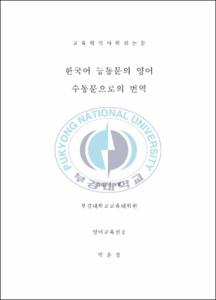한국어 능동문의 영어 수동문으로의 번역
- Abstract
- The purpose of this study is to investigate the phenomenon of the translation Korean active sentences into English passive sentences. It is a usual way to translate Korean active sentences into English active sentences. However, It is frequently found that Korean active sentences are translated into English passive sentences. But it hasn't been proved how that kind of translations happen and what causes this practice. For this study, 107 sentences are analyzed from Kyung-Sook Shin (2008) Please Look After Mom and its English version written by Chi-Young Kim (2011). From Korean-English parallel language data, a total of Korean active sentences translated into English passive sentences is 107. These are put into 6 subtypes: transitives(51.4%), intransitives(31.8%), adjectives(5.6%), nouns(8.4%), and adverbs(2.8%).
This paper explains these Korean-English translations in terms of grammatical difference between Korean and English in coding less topical agents than nonagent participants, and Ikegami's typological difference between Korean(BECOME-language type) and English(Do-language type).
- Issued Date
- 2013
- Awarded Date
- 2013. 8
- Type
- Dissertation
- Publisher
- 부경대학교
- Affiliation
- 교육대학원
- Department
- 교육대학원 영어교육전공
- Advisor
- 김은일
- Table Of Contents
- ABSTRACT ⅳ
제 1 장 서론 1
제 2 장 이론적 배경 4
2.1 영어 수동문의 범위 4
2.2 주제성 비초점화 6
2.3 Ikegami의 언어 유형론 7
제 3장 한국어 능동문의 유형별 분류 및 토의 9
3.1 한국어 원 문장의 유형과 빈도 9
3.2 한국어 능동문의 유형과 영어 수동번역문 10
3.2.1 타동사 10
3.2.2 자동사 17
3.2.3 형용사 24
3.2.4 명사 28
3.2.5 부사 30
제 4장 결론 32
병렬 언어 자료 34
참고문헌 35
- Degree
- Master
- Files in This Item:
-
-
Download
 한국어 능동문의 영어 수동문으로의 번역.pdf
기타 데이터 / 460.38 kB / Adobe PDF
한국어 능동문의 영어 수동문으로의 번역.pdf
기타 데이터 / 460.38 kB / Adobe PDF
-
Items in Repository are protected by copyright, with all rights reserved, unless otherwise indicated.